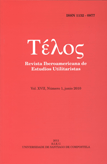On John Stuart Mill’s notions of logic and argument
Contido principal do artigo
Resumo
My aim in this paper is to discuss Mill’s notions of logic and argument and to highlight the epistemic dimension that for Mill has every argument and that, it is in the light of this epistemic dimension, that an argument should be assessed. By taking into account these considerations, I focus on his criticism against deductive arguments to the effect that they commit the fallacy of begging the question. I try to show that this idea relies on his radical empiricism and argue that he is wrong. He particularly fails to recognize how we can gain knowledge from deductive arguments, though their conclusions are already contained in the premises. Finally, I point out the fact that, by his insisting in the epistemic dimension of arguments, Mill’s ideas are closer to those of argumentative theorists.
DOI http://dx.doi.org/10.15304/t.20.1.2517






